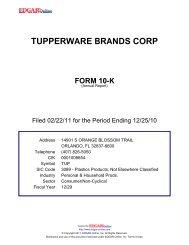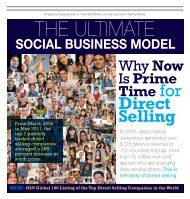Nu Skin 2010 Annual Report - Direct Selling News
Nu Skin 2010 Annual Report - Direct Selling News
Nu Skin 2010 Annual Report - Direct Selling News
Create successful ePaper yourself
Turn your PDF publications into a flip-book with our unique Google optimized e-Paper software.
on a sustained basis. Factors that could affect our ability to continue<br />
to introduce new products include, among others, government regulations,<br />
the inability to attract and retain qualified research and development<br />
staff, the termination of third-party research and collaborative<br />
arrangements, proprietary protections of competitors that may<br />
limit our ability to offer comparable products and the difficulties in<br />
anticipating changes in consumer tastes and buying preferences. In<br />
addition, in our more mature markets, one of the challenges we face<br />
is keeping distributor leaders with established businesses and high<br />
income levels motivated and actively engaged in business building<br />
activities and in developing new distributor leaders. There can be no<br />
assurance that our initiatives will continue to generate excitement<br />
among our distributors in the long-term or that planned initiatives will<br />
be successful in maintaining distributor activity and productivity or in<br />
motivating distributor leaders to remain engaged in business building<br />
and developing new distributor leaders. Some initiatives may have<br />
unanticipated negative impacts on our distributors, particularly<br />
changes to our compensation plan. The introduction of a new product<br />
or key initiative can also negatively impact other product lines to<br />
the extent our distributor leaders focus their efforts on the new product<br />
or initiative. In addition, if any of our products fail to gain distributor<br />
acceptance, we could see an increase in returns.<br />
The loss of key high-level distributors could negatively impact our<br />
distributor growth and our revenue.<br />
As of December 31, <strong>2010</strong>, we had a global network of approximately<br />
800,000 active distributors. Approximately 36,000 of our<br />
distributors were executive distributors. Approximately 480 distributors<br />
occupied the highest distributor level under our global compensation<br />
plan as of that date. These distributors, together with their extensive<br />
networks of downline distributors, generate substantially all of<br />
our revenue. As a result, the loss of a high-level distributor or a group<br />
of leading distributors in the distributor’s network of downline distributors,<br />
whether by their own choice or through disciplinary actions<br />
by us for violations of our policies and procedures, could negatively<br />
impact our distributor growth and our revenue.<br />
We are currently involved in disputes regarding customs assessments<br />
in Japan and any adverse rulings in these matters could require<br />
us to take charges to our earnings.<br />
We are currently involved in two separate disputes with the customs<br />
authorities in Japan with respect to duty assessments on several<br />
of our Pharmanex nutritional products totaling approximately 5.3<br />
billion Japanese yen as of December 31, <strong>2010</strong> (approximately $65.3<br />
million), net of any recovery of consumption taxes. We also recently<br />
were notified that we are likely to receive an additional assessment of<br />
0.6 billion Japanese yen (approximately $7.7 million) related to the<br />
second dispute.<br />
The first dispute relates to additional customs assessments made<br />
by Yokohama Customs for the period of October 2002 through July<br />
2005. The aggregate amount of these additional assessments is 2.7<br />
billion Japanese yen (approximately $33.2 million as of December 31,<br />
<strong>2010</strong>), net of any recovery of consumption taxes. The final hearing on<br />
this matter was held on February 1, 2011 and the court indicated it<br />
would issue a decision on this case on March 25, 2011. Either party has<br />
the right to appeal this decision. If we receive an adverse decision in<br />
this case, we may be required to record an expense for the full amount<br />
of the disputed assessments, or $33.2 million.<br />
The second dispute relates to additional customs assessments<br />
made by Yokohama Customs for the period of October 2006<br />
through November 2008 in connection with an audit in 2009, as well<br />
as the disputed portion of our current import duty rate we have been<br />
required to pay or hold in bond, and have paid under protest, since<br />
October of 2009. The aggregate amount of these additional assessments<br />
and disputed duties is 2.6 billion Japanese yen as of December<br />
31, <strong>2010</strong> (approximately $32.1 million), net of any recovery of consumption<br />
taxes. We were also recently notified that we are likely to be<br />
assessed an additional 0.6 billion Japanese yen (approximately $7.7<br />
million), net of any recovery of consumption taxes based on an audit<br />
of the period of November 2008 through September 2009. With this<br />
assessment, we have been required to pay or hold in bond amounts<br />
for all periods from October 2006 to present and we believe that<br />
additional assessments related to any prior period would be barred<br />
by applicable statutes of limitations. To the extent that we are unsuccessful<br />
in recovering the amounts assessed and paid or held in bond,<br />
we will likely be required to record an expense for the full amount of<br />
the disputed assessments, or $32.1 million as of December 31, <strong>2010</strong>.<br />
Government authorities may question our tax positions or transfer<br />
pricing policies or change their laws in a manner that could increase<br />
our effective tax rate or otherwise harm our business.<br />
As a U.S. company doing business in international markets<br />
through subsidiaries, we are subject to various tax and intercompany<br />
pricing laws, including those relating to the flow of funds between our<br />
company and our subsidiaries. From time to time, we are audited by<br />
tax regulators in the United States and in our foreign markets. If regulators<br />
challenge our tax positions, corporate structure, transfer pricing<br />
mechanisms or intercompany transfers, we may be subject to fines<br />
and payment of back taxes, our effective tax rate may increase and<br />
our operations may be harmed. Tax rates vary from country to country,<br />
and, if regulators determine that our profits in one jurisdiction may<br />
25









